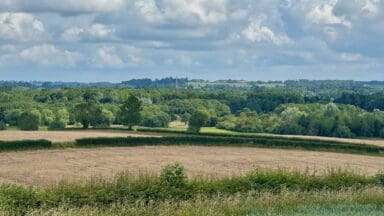
Commissioned by The Lifescape Project and Wildlife & Countryside Link, research by eftec reveals that of the 80,400 approved applications in the scheme’s first year, 69,500 (86%), claimed exemptions from BNG requirements. According to the study, this could rise to 97% if all small developments are removed from BNG requirements as proposed in the current government consultation.
This shift would leave over 215,500 hectares of land – approximately to the scale of the Yorkshire Dales or Snowdonia, open to development without any compensation for biodiversity loss. Environmental groups warn this undermines and weakens the policy that was designed to ensure developers contribute to nature recovery.
Small sites dominate planning in England. Currently, around 95% of planning applications are for sites under 1 hectare, 88% are under 0.5 hectares and 77% are for sites under 0.2 hectares. The move to remove such a large proportion of development being taken out the BNG scheme by small site exemption, undermines the viability of the BNG scheme.
“Biodiversity Net Gain is a hugely important principle: industries that harm nature should contribute to its recovery. The proposal to drastically widen the number of exempt small sites from the system would be a return to the bad old days of damaging development and torpedo confidence in private investment in nature recovery. eftec’s research shows that by removing only the very smallest sites from the system while closing loopholes for larger developments, the Government could make sure Biodiversity Net Gain works for nature as it was intended, as well as benefiting the genuinely small-scale developments that don’t pose a threat to nature,” said Richard Benwell, CEO of Wildlife and Countryside Link.
In line with the perspectives of environmentalists and economists, the research underscores that the proposed government initiatives to exempt all minor developments from the Biodiversity and Nature Conservation (BNC) regulations pose a significant threat to nature recovery. This raises concerns regarding the long-term sustainability of the biodiversity unit market. The study suggests that the relaxation of BNC regulations would permit developers to evade approximately £250 million annually in biodiversity compensation, a substantial increase from the current annual loss of £180 million attributable to the current exemptions.
Environment groups say BNG constitutes the second most important source of funding for environmental restoration, after nature-friendly farm funding, and this shift will “drastically widen the number of exempt small sites from the system would be a return to the bad old days of damaging development and torpedo confidence in private investment in nature recovery.”
The report offers an alternative approach which exempts only sites smaller than 0.1 hectares and suggests closing loopholes that currently allow larger sites to sidestep requirements. This would reduce administrative burdens for more than 50,000 of the smallest developments and strengthen compliance. According to the report, this would result in twice the area of land contributing to nature recovery (an additional 20,552 hectares) and double the size of the biodiversity market compared to the Government’s current proposals.
Adam Eagle, CEO of The Lifescape Project, added: “As a Responsible Body, we are fully invested in ensuring that the BNG market functions properly and we see it as a key tool to drive more funds into nature restoration. We have had concerns for some time about poor implementation and issues with policy design. However, the proposed changes won’t fix this. Exempting all small sites from BNG rules will let thousands of builders demolish nature without paying for the damage, and we will all foot the repair bill, while wildlife pays the price with silence.
“The Government’s proposals are reckless for nature and for taxpayers and are bad for business too as they will bulldoze an emerging and innovative biodiversity credit market.”
The BNG consultation for minor, medium and brownfield development closes on the 24th July 2025.

